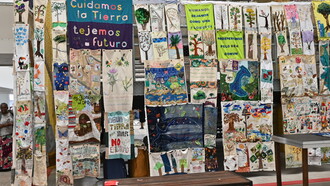The world is ever closer to midnight. More precisely, we are 90 seconds away from midnight, according to Doomsclock 2023. This midnight, however, will not be marked by fireworks and celebration of a new beginning, a new year but the beginning of the end of civilization as we have come to watch. It is interesting to draw a parallel between this clock and the basic physical determinations of time. Namely, although, for example, in string theory there is a large number of possible dimensions (spatial is, for example, 9 or 10, depending on the theoretical approach), time is only one. Although the reason can be found in mathematical inconsistencies when introducing multiple time dimensions, logically and philosophically speaking, it is clear that real time cannot be turned back. Time is linear and straight—something often called the arrow of time.
Therefore, doomsclock is a very pessimistic means of depicting the approach to the end because we cannot turn back time, nor can we slow it down. But doomsclock is not the only one that is pessimistic. Although this is just a metaphor, pessimism can be found in the reality of the social world and the ways in which we adapt to ecological challenges. Since 1866, when the concept of ecological awareness was first used (Caporali, 2021), the human species has been dancing a challenging dance with the consciousness of the harm it causes (primarily to itself and civilizational processes) and the benefits that arise from causing the mentioned harm. Somehow, over the last 200 years, we have more often dance with this other partner (it is interesting to look at this partner as a man who has transferred the patriarchal logic of domination to the world of resources). Using a more understandable vocabulary, we more often return to the consolation of benefits, growth, wealth, and hedonism rather than real reflection on the harm we do in the process.
However, today, we are aware of the harm we are doing. Despite being keenly aware of ecological issues, even through the rejection of contemporary scientific conclusions, we try to rationalize the changes happening in our environment. This awareness has existed for almost 70 years, intensifying over the past ten to twenty years within the framework of a general-global public narrative. Nowadays, discussions and a kind of paternalism regarding ecological awareness or actions aimed at preserving nature are increasingly prevalent. It could be said that preserving nature has become the ideal of the 21st century, an ideal that guides us in constructing our daily lives. Thus, we often feel good when we recycle, protest against large corporations, do not eat meat, etc., but at the end of the day, we buy plastic, brands, and nicely packaged and stylized vegan products. On one side of our existence, we do "good" so that we can enjoy the comfort that the world of modernity has afforded us without guilt. In short, ecological awareness is devoid of real reflexivity, real impact, and real existence; it is just a simulation of what is needed, a simulation in which we enjoy (almost masochistically), but which does not do much. As evidence, we can mention the CO2 emissions in the world over the years. Despite significant attempts at regulation, CO2 emissions in 2015 were 35.46 billion metric tons, and in 2022, 37.49 billion metric tons. Therefore, despite regulation policies and individual awareness, global CO2 emissions are increasing.
Duty-bound ecological moralists may respond to this argument by saying that these emissions are produced in certain countries that foster heavy industries and/or production, but they forget that the global economy operates on products produced there, and their comfort and luxury of living come precisely from these emissions. The world we live in strives for green but practices something entirely different. We are committed to making changes that are beyond our reach. The question arises: why?
Commitment to change, even when it exists, encounters insurmountable obstacles and, as such, has no chance from the outset. The reason for this lies precisely in the concept that is the title of this presentation: green capitalism. What we could say about this phenomenon within the framework of sociology (theory of social systems), and very briefly, is that green capitalism is the way capitalism has adapted to the environment through its own code of action (payment or non-payment).
In the words of American sociologist Theodore Roszak, capitalism has an incredible ability to absorb and commodify elements of subcultures, countercultures, and antitheses of itself. The same happened with the ecological problems. These issues enter the trajectory of the capitalist code of action. Therefore, in order to maintain itself, capitalism had to absorb aspects of ecological practices and policies within itself while maintaining the basic principles – profit growth and capital accumulation. Thus, we can say that green capitalism certainly exists, but it is not the type of social system that can lead to the necessary changes for the world in its essence.
In other words, green capitalism is not green in the sense that we would like it to be. The logic of capital prevents the green color from becoming a potential for change; it is subordinate to the consumerist ethos, which makes it contradictory to itself yet again profitable. In this sense, we can talk about the profit increase of certain companies engaged in the so-called green economy (see Smith, 2008). We can talk about waste management as a very profitable business (Tharmia et al., 2022) and electric cars as a formula for success (see Chu et al., 2017). Despite the small steps taken through this type of capitalism, these steps are largely marked by the logic of capital at the macro level and the logic of consumption at the individual level. Ultimately, the accumulation of capital at the micro level opens new possibilities for the consumption of desires, hedonism, and narcissism. Therefore, green capitalism is useful not only for itself; it is rational for itself within the boundaries of its own system, but also for the individual who does not live oriented towards the future but towards a hedonistic present, hence for the alienated individual.
Capitalism is the total force of contemporary, global society, and the ethics of consumerism are its ideology. Through this ideology, ecological issues are considered only as a form of leisure activity, a kind of cultural commodity with which we can achieve our authenticity. Ultimately, the entire sphere of an individualized society, a society oriented towards cultural issues and risks, rests on increasing prosperity, expanding educational opportunities, and capitalism (Beck, 1986). Ultimately, to care about ecological issues, we must fulfil other, we might say, more basic forms of needs: to care about ecology, one must have time; to buy a bin that will help us separate waste more effectively, one must have money; to buy ecological products, we must spend "more." Nothing is exempt from capital accumulation. Therefore, ecological movements are, at their core, reserved for a category of people whom Karl Marx would call bourgeois humanists—humanists who can think of humanism, but primarily because of their privilege.
The issue of ecology, therefore, at least for sociologists, is also a class issue. It creates class-type tensions between those who impose certain ideals from a position of their own privilege and those who cannot fulfil these ideals due to a lack of resources. The resistance to climate change and ecological issues, therefore, arises in essence from resistance to capitalist ethics and the privilege that arises from it—a class that rises, first economically and then culturally, defining the narrative that everyone must follow. The resistance is not a result of negating the evident changes that have struck the world—changes in temperature, major storms, and hurricanes—the resistance is a result of our dissatisfaction with those who pose ecological issues as a priority while having their existence completely secured within the very system that produces the problem.
Is there a way out of such tensions and out of this approach to ecology (the approach of green capitalism)? The first step is to accept the irony of the entire situation—the irony that despite our desires, we do not do much. This irony must be primarily acknowledged by those who paternalistically address those who deny the problem (not that they do not understand it). Furthermore, a key point in understanding green capitalism, as well as a step towards necessary changes, is the realization that the issue of ecology in today's global society is first a class issue and then an issue of the world system in which the developed and wealthy center imposes ideals on other parts of the world—the semi-periphery and periphery. But as we have stated, the problem is not the ideals but the imposition of something that we ourselves do not fulfil, whether it's about classes or the centre within the framework of the global order. This is supported by data on the ecological footprint of countries. Indeed, the countries of consumerism and green capitalism are the ones that make the largest footprint, but despite this, they position themselves as moral verticals in relation to nature.
Awareness is not enough. In contemporary modern societies, it is primarily necessary to examine oneself and to valorize one's own starting points so that we can approach others. Therefore, we could conclude that the issue of ecological movements, climate change, and green capitalism is a question of communication, either with ourselves, with others in our environment, or with the structure that regulates the patterns of our possible actions (for example, the economy in our case). However, real communication is increasingly eluding us. The approach to others for communication and learning is changing in favor of communication whose purpose is to protect our ideal self"—communication in which we communicate only to be heard but not to hear others—narcissistic communication.
References
1 Beck, U. (1992). Risk society: Towards a new modernity. Sage Publications Ltd.
2 Caporali, F. (2021). Ethics and sustainable agriculture. Cham, Switzerland: Springer, doi:10.1007/978-3-030-76683-2.
3 Yan, Chu., Qishi, Xiao., Yang, Linqing. (2017). Electric vehicle business model innovation study from the perspective of the energy internet, doi: 10.1109/EI2.2017.8245632.
4 Roszak, T. (1978). Kontrakultura: Razmatranja o tehnokratskom društvu i njegovoj mladenačkoj opoziciji. Naprijed.
5 Shruti, Tharmia., Riddhi, Nilawar., Nikita, Aswale., Shubhadra, Kumari., Poonam, Gupta. (2022). Waste Management and Wealth Generation Through Waste Elimination, doi: 10.1109/ICICICT54557.2022.9917808.
6 Annual carbon dioxide (CO₂) emissions worldwide from 1940 to 2023.















